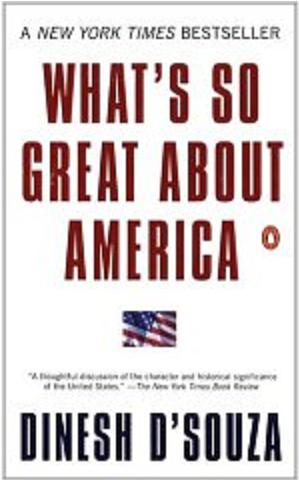What's So Great About America
by Dinesh D'Souza
(Penguin Books, 2002, 218 pages, US$15.00)

Dinesh D'Souza is an Indian boy made good in America, an immigrant success story. He has a great deal to be grateful for, but, he argues, so does the rest of the world. After the tragedy of September 11 2001, the US faces the classic dilemma of free peoples, "how to articulate the blessings of freedom ... and how a society accustomed to the pleasures of private life can prevail against a more militaristic regime ... whose fighters are cheerfully willing to endure death".
His plea to the US is to take seriously its enemies. After Afghanistan and Iraq, he no longer has to worry on that score. The US has its critics, such as the Europeans who worry about a unipolar world, and their place in it, and Islam, whose objections are moral. Islam questions whether legitimate political authority comes from God or man, indeed, whether reason or revelation is a more reliable source of truth. There can be no more fundamental objection to American civilisation.
In the face of such a determined critique, D'Souza directs his attention to America's internal enemies, the intellectual left and its primary vehicle, multiculturalism. "Multiculturalists seek to fill white Americans with an overpowering sense of guilt and blame so that they accept responsibility for the sufferings of minorities in America and poor people in the rest of the world". He wants to convince these people that there is something great and noble about America, and having convinced them, to join him in defence of modernity, against Islam.
The favoured vehicle of the multiculturalists is oppression theory -- ethnocentrism, colonialism, imperialism and racism. It is a favourite theory of the multiculturalists because it allows them to account for "the disjunction between their dogma of cultural equality and the reality that cultures are far from equal". He argues, of course, that there is nothing especially ethnocentric about the West; any old tribe is ethnocentric, including and especially Islam. The West, on the other hand, has gained immensely from the absorption of ideas and inventions of other cultures. Its great achievement is the ability to transcend ethnocentrism.
If ethnocentrism is not Western, what about colonialism? Dinesh reminds his readers that the British were the eighth or ninth colonial power to invade India, and certainly the most beneficial. Although it may not have been their intention, the colonialists brought to India ideas and systems that immeasurably enriched the lives of the descendants of colonialism. Slavery, in particular, is not unique to Western colonialism, but what is distinct to the West is its abolition! As for the West growing rich and powerful by exploiting everyone else, the fact is that before British rule there were no rubber trees in Malaya, nor cocoa trees in West Africa, nor tea in India. Spices did not make the West wealthy!
D'Souza relates a story of a Sri Lankan postgraduate student who attended one of his lectures on America. The student: "Am I supposed to tell my people that America is the best and that they are shit?" D'Souza suggested to the student that he would not state it in those terms, but, clearly, much anti-Americanism among intellectuals from the Third World is a way to salvage pride. Colonialism and imperialism are not the cause of the West's success; they were a result of that success.
Dinesh suggests that science, democracy and capitalism are the reasons the West became the dominant civilisation in the modern era. These three institutions are an immense challenge to the enemies of the West. To beat the West, they need to take advantage of these features. If they take advantage, they will no longer be non-Western.
D'Souza concludes with a flourish, "America is the greatest, freest, and most decent society in existence. It is an oasis of goodness in a desert of cynicism and barbarism". I think he is mistaken; he is really referring to the West as a whole, or perhaps the Anglosphere. We can forgive him his enthusiasm for the US, but those gifts of many cultures, nurtured and perfected by the West -- science, democracy and capitalism -- are not America's alone. We are grateful, nonetheless, that the US is their champion.
No comments:
Post a Comment